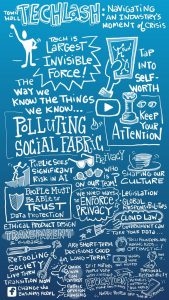
“Techlash” by Fortune Conferences is licensed under CC BY-NC-ND 2.0
Techlash is a term used by economists to describe a phenomenon in today’s society. Specifically, it refers to the negative sentiment and hostility of the public towards the increasing power and strong influence of large technology companies. The decline in trust and opposition to the development of modern technology. The public believes that technology companies have become too powerful and exclusively controlled. They are no longer freely sharing platforms and channels and have become the masters behind the control of the wind. The risks brought by network technology far outweigh the benefits.
Forward
The benefits of technology are obvious, especially since the new crown epidemic, it is inconvenient to travel and it is difficult to gather people. Students in most countries take classes online through zoom and connect with family and friends through social platforms. Thanks to the convenience brought by the technology network, the normal operation of social life can be achieved. But everything has two sides, and while bringing great gains, his risks and problems are also inevitable.
With the popularization of scientific and technological products in recent years, almost no one knows how to use electronic devices, and everyone’s proficiency in using them has also been improved. Of course, many problems have been discovered by everyone. Almost all software or websites require personal information for authorization and log-in. In the beginning, it is very convenient for people to express their opinions and save their own preferences. It seems that only they can view personal information, which protects privacy, but this is not the case.
Invasion of privacy
More and more users find that privacy is not protected and personal information is exposed. In previous years, Tencent made it clear that due to the different censorship rules in the country and region, WeChat China indeed monitors and tracks user information and comments. However, users under the overseas manager will not have this problem and can close it by themselves. Although users may not be Chinese citizens, as long as they are in China, they will also be subject to supervision. There is no way to guarantee freedom of speech, and they cannot discuss politically sensitive vocabulary. Once discovered, they will be checked or even banned.
Filter bubbles
Nowadays, there is endless social software in society, and the mobility of users is also great, but the few very popular software have not been replaced because of what. In order to attract and retain users, Internet companies only recommend content that you may like when screening information and recommending information, in order to cater to user preferences. Gradually expel information that disagrees with you. Because at every moment you click to watch, or even when you stay for a few more seconds, the computer will record your behavior, and then filter the information through algorithms. Over time, users can only access what they accept, while other diversified and rich information cannot be received. Strictly speaking, this is a limitation, abandoning the original intention of the Internet to widely disseminate diversified information and promote development.
In this age of the Internet, with the popularization of science and technology, the phenomenon of precocity among young people has become more and more serious. Students in this age group generally do not have the ability to distinguish right from wrong. Although they are exposed to the Internet prematurely, it will not only bring about positive effects, on the contrary, there will be more negative effects. There are many incorrect statements on the Internet that cannot be guaranteed to be completely controlled and eliminated. The establishment of incorrect values has a very serious impact on the growth of a teenager, and juvenile crime is often caused in this way.
Solve?
The easiest and fastest way is actually the self-regulation of large technology companies, which means that consumers can be protected and helped faster. However, since the main motivation of the platform company is the company’s development and profits, it does not consider public value too much, it is difficult to ensure fair supervision of itself, and the execution of self-supervision is not strong. Under absolute interests, technology companies will never be unwilling, so self-regulation is almost empty talk.
The government’s supervision system will be much better, and the supervision will be further completed through the implementation of sound laws and policies. But what comes with it is that the speed is very slow, and the process of rule-making, monitoring, and enforcement takes time. From ancient times to the present, problems are discovered and then solved. The problems will always appear earlier than the solutions to the problems. Although the policies may have been perfect in the present time, there will still be people taking advantage of the law to seek benefits. The government is very difficult to keep up with the pace of technological innovation.
In summary, this is a phenomenon that is difficult to choose and deal with. It is impossible for people to completely abandon the electronic age and return to the primitive. The inconvenience and closure brought by primitive life are more serious than the horror. It is also impossible for people to completely solve the control and control of technology companies. The only thing they can do is to find problems and solve them, and follow the pace of the times. It’s totally useless to complain and resist. There is no free lunch in the world, and while technology companies bring convenience, they will also pay. The best way is proper control and proper acceptance.
References
Bettilyon, T. E. (2019, August 28). Redirecting the Techlash. Medium. https://onezero.medium.com/redirecting-the-techlash-74065169b352
BOCSAR | NSW Bureau of Crime Statistics and Research. (n.d.). Is juvenile crime increasing? https://www.bocsar.nsw.gov.au/Pages/bocsar_fastfact_03.aspx
Cyjax. (2020, March 6). WeChat: How private is your data? https://www.cyjax.com/2019/11/29/wechat-how-private-is-your-data/
History – New South Wales AECG. (n.d.). New South Wales AECG – NSW Aboriginal Education Consultative Group. https://www.aecg.nsw.edu.au/about/history/
Information Technology&Innovation Foundation. (2019, October 28). A Policymaker’s guide to the “Techlash”—What it is and why it’s a threat to growth and progress. ITIF | Information Technology and Innovation Foundation. https://itif.org/publications/2019/10/28/policymakers-guide-techlash
Schiffer, Z. (2019, November 25). WeChat keeps banning Chinese Americans for talking about Hong Kong. The Verge. https://www.theverge.com/2019/11/25/20976964/chinese-americans-censorship-wechat-hong-kong-elections-tiktok
Susarla, A. (2021, February 22). If big tech has the will, here are ways research shows self-regulation can work. The Conversation. https://theconversation.com/if-big-tech-has-the-will-here-are-ways-research-shows-self-regulation-can-work-154248
Team, R. C. (2020, February 12). Social media: How do other governments regulate it? BBC News. https://www.bbc.com/news/technology-47135058
Thomson Reuters Foundation. (n.d.). The truth behind filter bubbles: Bursting some myths. Reuters Institute for the Study of Journalism. https://reutersinstitute.politics.ox.ac.uk/risj-review/truth-behind-filter-bubbles-bursting-some-myths
West, D. M. (2021, April 2). Techlash continues to batter technology sector. Brookings. https://www.brookings.edu/blog/techtank/2021/04/02/techlash-continues-to-batter-technology-sector/


